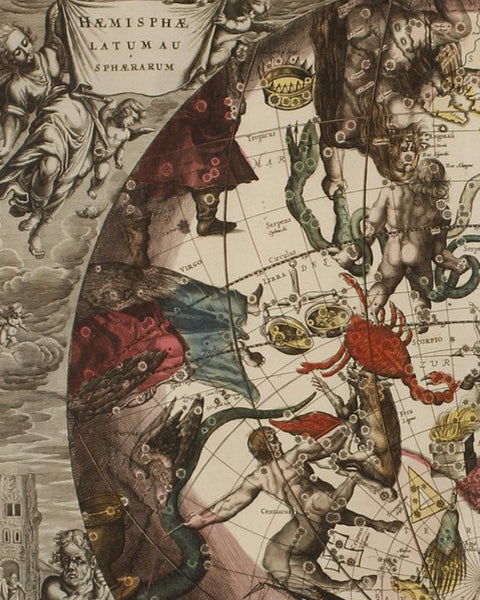Arader Galleries
Hæmisphærium Stellatvm Boreale Cvm Subiecto Hæmisphærio Terrestri (2)
Pickup currently unavailable
Plate 26 – Hæmisphærium Stellatvm Boreale Cvm Subiecto Hæmisphærio Terrestri (2)
From: Atlas Coelestis seu Harmonia Macrocosmica
Amsterdam: Schenk and Valk, 1708
Hand-colored copperplate engraving
36 1/2” x 32" framed
This plate finalizes documenting the Northern Hemisphere’s constellations, with their traditional orientation. There are 29 Ptolemaic constellations from Petrus Plancius. The plate is similar in its aesthetic to the other constellation plates by Cellarius. It has a filled and intricate center, accented by a decorative cartouche displaying various mythological and divine figures.
An interesting detail about this plate is the labeling of the stars in Orion’s belt. In this plate they are named “Drie Koningen” (The three kings). “This popular name was commonly used by Dutch mariners and is explained by the fact that this asterism is particularly visible in the months around Christmas.”
In this plate specifically, the center circle is supported by Hercules and the Titan Atlas. In Greek mythology Atlas was cursed to hold the sky, celestial sphere, upon his shoulders, which explains why he is the Titan associated with astronomy and navigation. Hercules, in order to complete one of the Twelve Labors sent upon Hercules from Hera, he sought assistance from Atlas. Hercules held up the heavens for a short period of time for Atlas to get some apples from Hera’s garden, which he did. Atlas, upon returning intended to trick Hercules into taking the burden, but was unsuccessful. Hercules agreed to take the burden as long as Atlas would hold it for just a moment while he prepared himself. Upon Atlas taking back this burden for what he thought would only be a short while longer, Hercules grabbed the Apples and ran away.
This piece provides many moments of visual enjoyment with all of its symbols, figures, and references. The craftsmanship exudes dedication and attention to detail whilst providing a platform for classical conversation.

